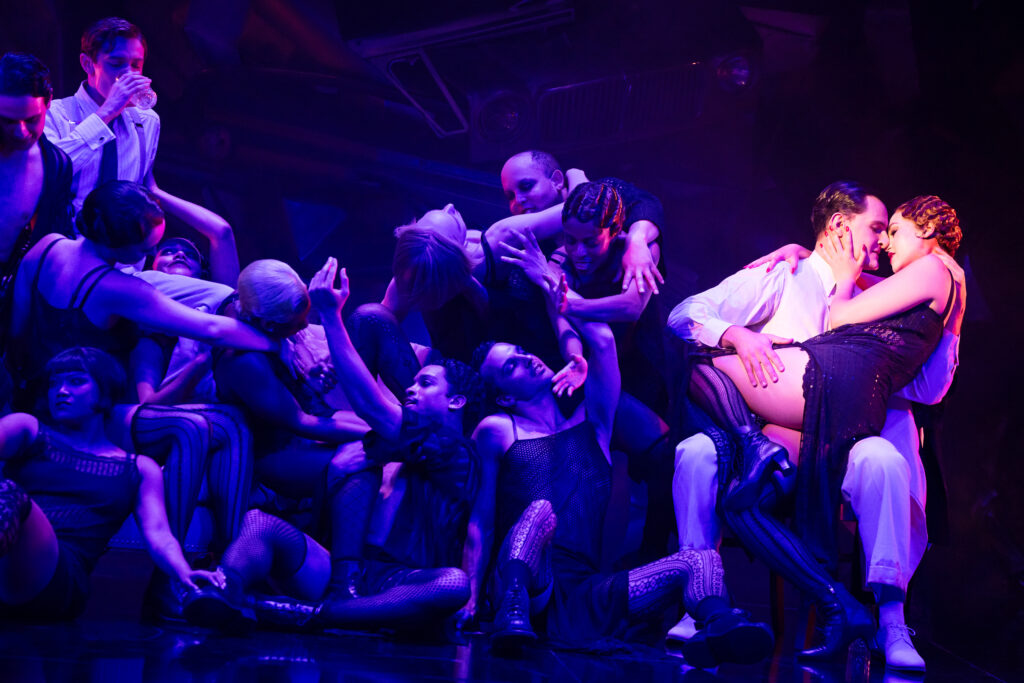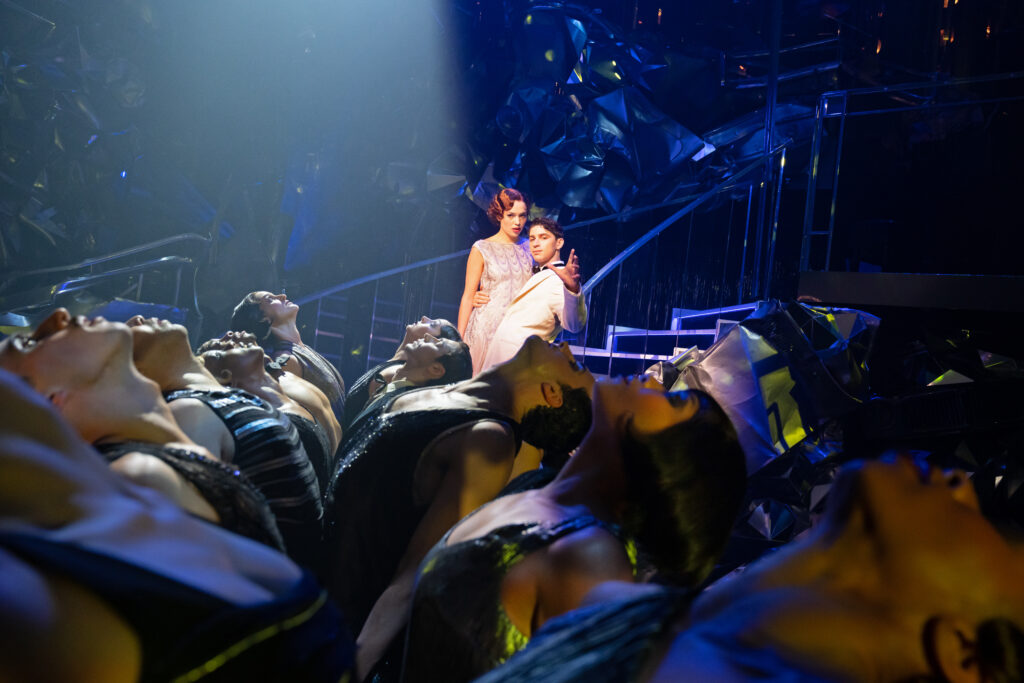
Presented by American Repertory Theater
Based on the novel by F. Scott Fitzgerald
Music by Florence Welch and Thomas Bartlett
Lyrics by Florence Welch
Book by Martyna Majok
Music Directed by Wiley DeWeese
Choreographed by Sonya Tayeh
Directed by Rachel Chavkin
Dramaturgy by Nissy Aya
Fight and Intimacy Direction by Rocío Mendez
July 23 – August 3, 2024
Loeb Drama Center
64 Brattle Street
Cambridge, MA 02138
This production contains depictions of suicide, violence, loud noises, gunshot sounds, bright and flashing lights, fog, and haze. Recommended for ninth grade and up.
Critique by Kitty Drexel
CAMBRIDGE, Mass. — Chavkin, Majok, and Welch’s Gatsby: An American Myth uplifts the plight of America’s laboring proletariat in ways F Scott Fitzgerald could never, would never imagine. It is a work of striking work of intersectional feminism that denudes the superficial morality of ultra-privileged one-percenters. It is sexy; it is rock n roll hot Jazz; it is a cautionary tale about the depravity of feral capitalism wrapped with a white bow.
F Scott Fitzgerald’s The Great Gatsby was first published in 1926. This critique discusses important plot points of the ART’s musical inspired by the novel. Anyone wishing to avoid spoilers is 98 years too late.
The novel already has two major movies (Jack Clayton in 1974 & Baz Luhrmann in 2013 (which includes a song by Florence + the Machine)), one Broadway play edited by Owen Davis, a 2021 London musical, a current Broadway musical, and countless albums. The Great Gatsby went into the public domain in 2022. The gloves are off.
The allure of the ART’s Gatsby isn’t in its original story but in its execution. Playwright Owen Davis adapted Fitzgerald’s novel for the stage shortly after it was published in 1926. Fitzgerald was notably still living. The play and the novel are vastly different. The characters remain the same but their backstories and the events are changed to suit the theatre conventions of the time. This makes sense. Novels and plays are vastly different mediums. The dissimilarities abound. (Daniel and West’s edition by Cambridge University Press does a lovely job parsing the differences.)
Regardless, Fitzgerald approved of Davis’ script. According to the 2024 reprinting of Davis’ play by Cambridge University Press, Fitzgerald said in a January 1926 letter to Davis, “It is certainly a good play, and highly interesting, and it seems to me it has an excellent chance for success.” Reader, the play had a 112-performance run on Broadway. New York audiences approved of it, too.
Fitzgerald cared more about the quality of Davis’ adaptation than if it was scrupulously retold his novel with unflinching accuracy. If that standard was good enough for the writer; it’s good enough for me.
American Repertory Theater has charged its creative team with retelling The Great Gatsby for a modern audience. Chavkin, Majok, and Welch formed opinions about their source material and characters and made specific choices to communicate them to their audience. Gabsy is their thesis and mission statement. They start with a dive through Fitzgerald’s century-old lament about the rich getting richer while the poor are getting poorer to give greater depths to Fitzgerald’s secondary and tertiary male and female characters: Daisy, Myrtle, Jordan, and even George Wilson the mechanic.
Daisy (Charlotte Macinnes) is still the sweet, helpless young woman onto whom Tom and Gatsby project their hopes, fears, and tainted dreams. In this version, Daisy has agency. We see her make decisions of consequence and react to them of her own volition. Daisy exists outside of her objectification; she is

more than a receptacle for male desire. Not much more, but enough for her unbridled attraction to Gatsby (Isaac Powell, whose portrayal is like a Newsies approach to Mackie Messer) to become a revolutionary act.
Fitzgerald fridged Myrtle Wilson in his original novel. Myrtle (Solea Pfeiffer, who absolutely destroys the stage with her dancing and strong belt) gets a chance to explain herself in Gatsby. She is no longer collateral damage; Majok and Welch distribute to her opportunities to grab life by the jockstrap and pull debauched joy from its nethers.
Chavkin, Majok, and Welch let Jordan (Eleri Ward) and Nick (Ben Levi Ross) be queer. Fitzgerald’s novel’s queer undertones are brilliant, bold statements in the musical: there are mascs in dresses, femmes in pants, no holds barred orgie scenes, and women portrayed in male-dominated professions. Their queerness is immediate, intentional, and deeply satisfying. Expressions of such will simultaneously delight and piss off the correct people.
Gatsby and Tom (Cory Jeacoma) largely stay the same. They are arrogant narcissists who spend money extravagantly in the limelight while impoverished masses starve in the shadows. Wilson (Matthew Amira) gets a backstory beyond running a garage. He’s also a washed-up simp with no business sense. Unlike Gatsby and Tom who choose to be millionaire pricks, Wilson suffers from bad luck and lost opportunities. Amira plays him with tenderness and dignity.
Gatsby’s acting and vocal talent is grand. The leads are stellar and the ensemble is even better. The swings have to do everything the leads do just in case, and they perform flawlessly in the ensemble.
Fans of Florence + the Machine will enjoy the music of Gatsby (Welch and Thomas Barlett). Her music excels when she isn’t trying to wedge it into a musical theatre format. It works best in the show and the cast’s voices when she lets it progress naturally from her rock songwriting. Those numbers are expressive, rich, and emotionally central to the plot.
Welch has written some absolute monster bangers for the ensemble and the leads. “Welcome to the New World” had me wondering if Chavkin, Majok, and Welch wrote a part for Madame Guillotine in Fitzgerald’s opus. Her fans will sing “Golden Girl” and “Shakin Off the Dust” as they exit the theatre. Both numbers capture the quintessence of Welch’s writing style and musical voice. “Feels Like Hell” is the breakaway dance number that will stop the show with its flamboyant excitability. Adam Grupper as Wolfsheim is the devil Gatsby sold his soul to. He’s brutish, loud, and will charm the pants off of your uptight, modest grandma. If you don’t see Gatsby at ART, you’ll likely catch this number at the Tony’s. The original cast album can’t arrive soon enough.
The creative design was equally as laudable. The choreography and intimacy direction were awesome: sexy and evoked the good name of Josephine Baker, her banana skirt, and cheetah. I’m running out of space for accolades. Top to bottom, everything was the bee’s knees.
About the Yondr pouches: they are a necessary evil. They preserve the musical’s secrecy for the creators. AND, not a damn cell phone went off during the show. No one forgot or thought it was on silent during a quiet monologue. No one was texting their great Aunt Sally in Peoria about their weekend plans as Daisy swooned in Gatsby’s arms. The audience could focus and the cast could perform with security. If a Yondr pouch is the most inconvenient part of your day, count yourself lucky.
Chavkin, Majok, and Welch work well together. Let’s hope this isn’t their only collaboration. Fitzgerald never got to see Davis’ The Great Gatsby. FSF was in France recovering from colitis. Don’t be waylaid by misfortune. If you enjoy a glitzy spectacle and an overt takedown of narcissistic rich folks with more money than brains, do your best to see Gatsby in Cambridge – if you can get tickets. They are mostly sold out.
The Great Gatsby is about disillusionment, the emptiness of American consumerism, and the decay hiding beneath unlimited decadence. Gatsby: An American Myth repurposes all of these themes for the 21st century. It is opinionated and dark, but it offers hope to the denizens working towards a true American dream. The ensemble tells us that America is a place where we can all belong in the final number, “We Beat On.” Don’t listen to the loudest voices preaching hate. There is space for all of us in the US. We may have to eat the rich first. Who’s hungry?
